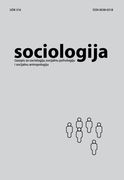Provođenje slobodnog vremena zavisnika od alkohola u periodu pijenja i periodu rehabilitacije
Ways of Spending Free Time by Alcohol Addicts During Periods of Drinking and Rehabilitation
Author(s): Slađana M. Dragišić Labaš, Milana M. LjubičićSubject(s): Social Sciences
Published by: Sociološko naučno društvo Srbije
Keywords: alcohol addicts; free time; family; rehabilitation; club
Summary/Abstract: In the introduction we discuss free time in the context of consequences of alcoholism on social, psychological, and especially family life, then, the changing use of free time as a significant symptom of alcoholism, and finally, the new organization of free time as an important goal of social reintegration of alcoholics’ families. In the next section, we examine ways in which members of Skela Club at the “Dr Laza Lazarević” Psychiatric Hospital spend their free time during periods of drinking, and during rehabilitation and social integration. The sample consisted of 30 subjects (25 men and 5 women), aged between 25 and 65, living in Belgrade or nearby, regularly attending Club meetings and actively participating in its work. A questionnaire with 35 questions, 32 closed and 3 open, was used. The first part referred to socio-demographic variables, the second to ways of spending free time during the period of addiction, and the third part to free time at present, in the stage of abstinence and rehabilitation. During the period of drinking, subjects were mostly spending their free time in the company of other addicts, in 80% of cases. Their leisure was not very interesting, as it consisted of very few activities: sitting in a bar (76.6%), watching TV (53.3%), reading newspapers (50%), sleeping (40%). In the period of drinking a large number of subjects, regardless of gender, felt lonely – 83%. During the period of abstinence, on the contrary, leisure is better organized, the number of activities increases, and their model changes to socializing with friends (76.6%), communication with family members (66.6%), going for walks (60%), reading books (50%), listening to music (46.6%), and sport activities (36.6%). The conclusion is that alcohol addicts spent their free time during the period of drinking significantly differently than at present, when they are undergoing treatment and rehabilitation. The difference in the quality and organization of free time at present and before is considerable, as is the amount of money invested in cultural and recreational activities. Abstinents spend more time with family, communicate better, renew old and establish new contacts. New ways of spending free time and family rituals are very important for their children since it prevents trans-generational transmission of alcoholism.
Journal: Sociologija
- Issue Year: 54/2012
- Issue No: 3
- Page Range: 527-548
- Page Count: 22
- Language: Serbian

